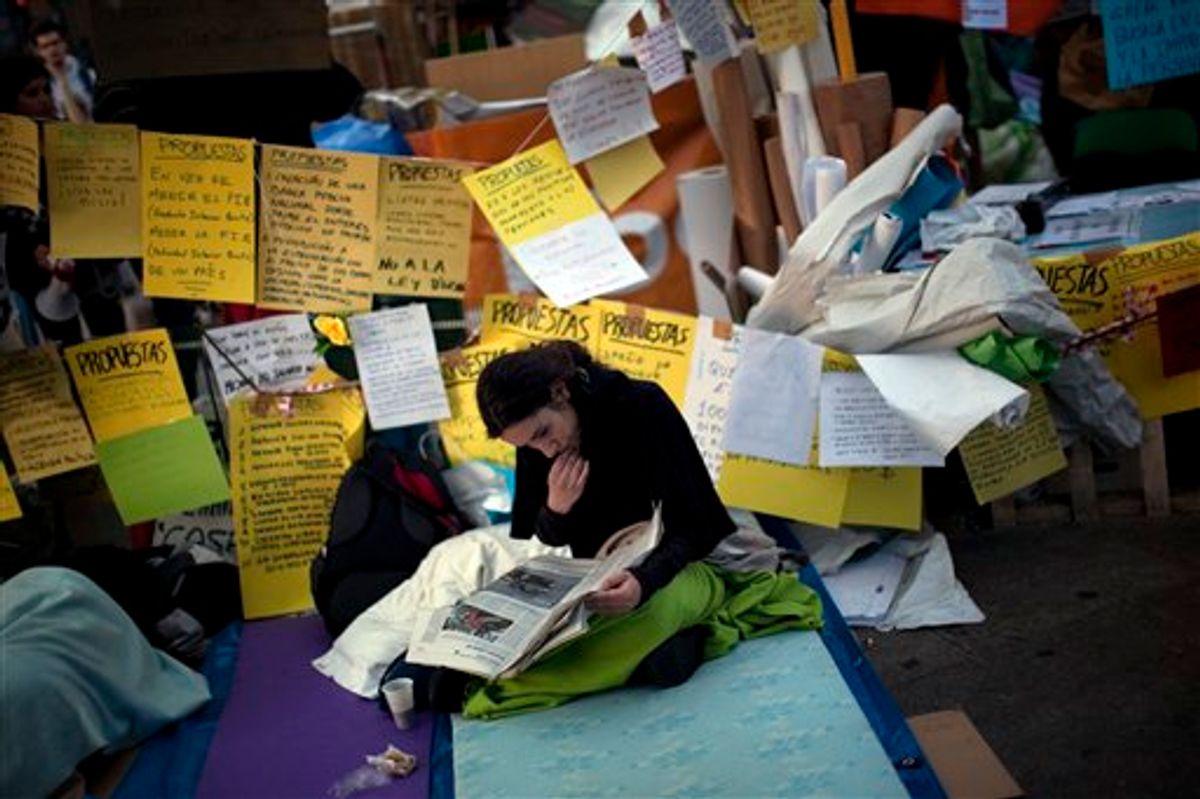Tens of thousands of people are defying a pre-election ban on demonstrations and protesting unemployment in squares around Spain in defiance of an order to quit at midnight.
The government avoided saying if it would order police to break up the crowds on Saturday, but at the stroke of midnight officers kept a discreet presence on the edges of the demonstrations.
Demonstrators kept quiet as city clocks chimed the beginning of a new day, many with sticky tape over their mouths in a gesture organizers said suggested they have things to say but were being gagged by the ban.
People are angry over Spain's high unemployment rate and what they see as the national political parties' ineptitude in dealing with a deep economic crisis. Protesters built a camp in Madrid's central Puerta del Sol square Sunday, a week ahead of nationwide elections. Since then good-natured, peaceful and colorful gatherings have sprung up and grown around the country under the banner of "Real Democracy Now."
Many protesters have said they were influenced by recent pro-democracy uprisings in North Africa and the Middle East and one popular chant is "Join us."
Friday was the last day for candidates to campaign for the election for municipal and regional government positions in much of the country. Citing the mandatory end of campaigning, the national election commission banned protests Saturday and on Sunday, voting day.
Prime Minister Jose Luis Rodriguez Zapatero did not say whether he would order police to break up demonstrations.
Interior Minister Alfredo Perez Rubalcaba was also cagey about how the government would deal with the protesters, although he said the police would not act to make things worse.
Initially he said the government will "enforce the law," but he then toned down this stance, saying "The police are not going to resolve one problem by creating another."
The ruling Socialist party is widely expected to suffer big losses at the polls, perhaps even in traditional strongholds, having been forced by the crisis to introduce austerity measures.
"They want to leave us without public health and public education. Half of our youth is unemployed and they have raised the age of retirement," said protester Natividad Garcia, who declined to give her age and profession.
The government is presiding over an economy struggling to overcome recession and create jobs to chip away at a 21.3 percent jobless rate, the highest in the eurozone.
In Spain, rallies called to urge people to vote one way or another are typically banned the day before an election, called "days of reflection."
The election commission was deeply divided this time, and upheld the ban by just a one-vote margin. The panel was convened to give a blanket ruling for all of Spain because provincial election bodies had issued contradictory rulings, with some allowing protests this week and some banning them, as was the case in Madrid.
Organizers of the protests say that they have no party affiliation, are not trying to affect the election outcome in any way, and are not even urging people to abstain from voting.
"Campaign posters are still going to be up, so why ban people from freely mingling to exchange ideas," said graphic designer Antonio Quiroga, 27.
Daniel Woolls contributed to this report.



Shares